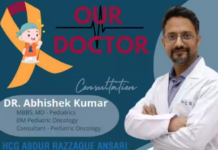New Delhi, June 08, 2019: The more knowledge we have acquired in the medical sciences; the more diseases we are coming across. While the increase in awareness has been a boon, the changing lifestyle is introducing us to an ample number of illness that either was not known earlier or didn’t exist. Tumors have become among the most dreaded words in not just the medical word but even otherwise.
One of the most serious forms of a tumor is the brain tumor which is a group of abnormal cells that initiate in the brain and can destroy brain cells and even damage cells by pressing on other surrounding parts of the brain, causing swelling and enhanced pressure inside the skull. Abnormal growth of brain cells forms a tumor which is likely to hit the brain parts responsible for controlling certain body functions and can cause a buildup of spinal fluid. However, the primary brain tumors generally do not spread outside the brain tissue. Not all brain tumors are cancerous, some are benign too (non-cancerous).
A significant transformation has been that brain tumor is no longer restricted to just the age, they can occur now even in children. One major concern with brain tumors among children is the lack of awareness around it and the misconception that it does not occur in children. However, brain tumor affects young and old alike and must be looked out for.
A 10-year-old boy suffered in the hands of the same scenario where neither his parents nor his teachers could rightly identify his symptoms, and further enhanced the tumor. Rahul (name changed), was put in a boarding school as he was mostly seen as a child not listening to anyone and constantly having a lot of complaints from his teachers. Taking the advice of the teachers and neighbors, Rahul’s parents admitted him to a boarding school hoping to get him back on track. But his irregularities worsened at the boarding school and he was found to be more disoriented with little ability to concentrate. He regularly complained of severe headaches and vomit but the teachers took it as escapism from classes.
Once his aunt visited him at the boarding school and saw him down with a fever, Rahul was taken to a nearby hospital and diagnosed with Typhoid fever. However, for further investigation, Rahul’s aunt brought him to Columbia Asia Hospital Whitefield. Rahul was presented with recurrent episodes of vomiting for a few months which were put down to him avoiding school/boarding school. He also had an abnormal gait which was put down to him being naughty and on examination, he also had a squint. All of these symptoms prompted an urgent MRI scan which revealed that he had been struggling with a brain tumor.
“It was not a sudden problem. The child had been showing symptoms but no one noticed. He even had an alcoholic gait; he used to sway while walking. Due to this delay of 7-8 months, the tumor had grown near the brain stem,” informed Dr. Tejus M N Rao, Consultant – Neurosurgery and Endovascular Neuro Intervention, Columbia Asia Hospital, Whitefield.
The case in points highlights how crucial it is to be observant of your child or any loved one’s behavioral changes and instead of putting them down try to look deeper into the problem, helping them come out of it before it is too late.
The signs and symptoms of a brain tumor usually vary based on the size of the tumor, its location and the rate of growth. Some general symptoms that could indicate a brain tumor are:
- Frequent, persistent headaches, alongside the feeling of increased pressure inside the head
- There could also be a new onset or change in the pattern of headaches
- Abrupt vision problems, blurring, and abnormal eye movement
- A fuller soft spot in babies
- Seizure even without any history of it and more in those who have a history of seizures
- Loss of appetite
- Difficulty in balance, swaying while walking
- The weakness of limbs, lethargy or loss of sensation
- Memory problem, confusion in routine things
- Behavior changes
- Rapidly enlarging head, in babies or toddlers
- Eventual loss of movement or sensation in a leg or an arm
- Hearing problems
Treatment for brain tumors in children is different from that for adult brain tumors. It thereby becomes very important to register the expertise and experience of pediatric specialists in neurology and cancer. However, the most important factor still remains the awareness that is required around brain tumors, more specifically around pediatric brain tumors and the observant responsibility that the near and dear ones around the affected person have.
Corporate Comm India(CCI Newswire)
























